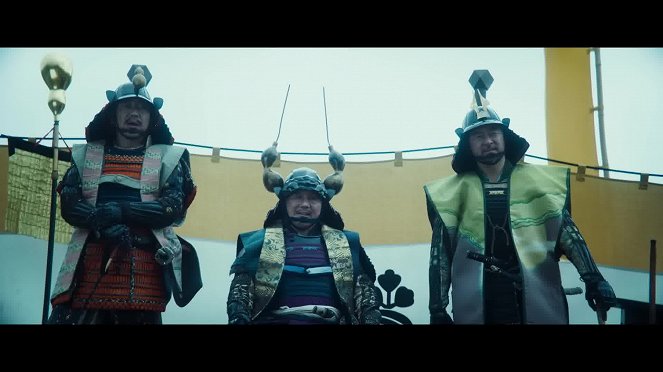Rendező:
Takeshi KitanoForgatókönyvíró:
Takeshi KitanoOperatőr:
Takeshi HamadaZeneszerző:
Tarō IwashiroSzereplők:
Takeshi Kitano, Hidetoshi Nishijima, Ryō Kase, Shidō Nakamura, 木村祐一, Ken'ichi Endō, Masanobu Katsumura, Susumu Terajima, 桐谷健太, 浅野忠信, 大森南朋, 六平直政, Makoto Ohtake (több)Tartalmak(1)
Set in the 16th century, as rival warlords battled to control Japan. Lord Oda Nobunaga, intent on controlling Japan, is waging war against several clans when one of his vassals, Araki Murashige stages a rebellion and promptly disappears. Nobunaga assembles his other vassals including Mitsuhide and Hideyoshi, and orders them to capture the fugitive Murashige, warning “I’ll choose whoever works hardest as my successor.” With various thoughts, schemes, and traps they carry out, they’re soon brought to a crossroads in a complicated situation. All roads lead to Honno-ji temple, where fate awaits them all. Which way will their heads roll…? (Cannes Film Festival)
(több)Videók (7)
Recenziók (1)
In the mould of Shin’ya Tsukamoto, Takeshi Kitano also banks on the samurai myth. Unlike the oppressive vision developed by Tsukamoto in the low-budget Killing, the master of deadpan humour has come up with a flashy costume epic that he approaches as a mercilessly caustic farce. In Kitano’s interpretation, the samurai ethos is shown to be absurdly empty bullshit that just destroys lives while having no real value or foundation. Similarly, the whole Japanese system consisting in the hereditary hierarchy is portrayed by the director, screenwriter and the actor playing one of the characters as completely demented nonsense that deprives people of their individuality and binds everyone to senseless subordination to the whims of a handful of privileged maniacs. The film’s narrative literally shows that this tradition, which is still revered by many Japanese today, relied on a senseless cycle of killing for promotion, so it is no wonder that those who went through it and held onto their positions for a while were driven to absolute madness. In addition to samurai virtues and the hierarchy of the period, Kitano also makes fun of many revered figures from Japanese history. He depicts all of the characters as buffoons and whores, though only very few of them are aware that they are such. But make no mistake, Kitano presents all of the above as spectacularly spiteful fun that gives his iconoclastic epic an appropriately sharp edge.
()
Galéria (41)
Photo © Kadokawa / T.N GON Co., Ltd.


